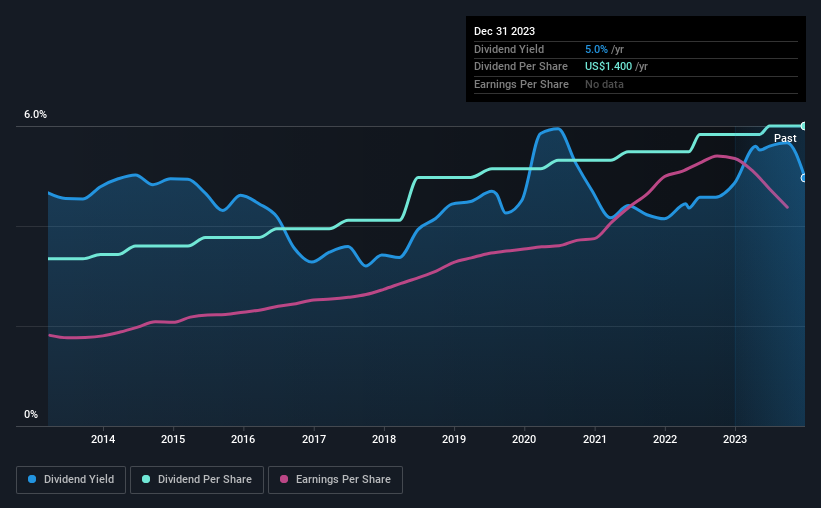The First Bancorp, Inc. (NASDAQ:FNLC) Looks Like A Good Stock, And It's Going Ex-Dividend Soon
Some investors rely on dividends for growing their wealth, and if you're one of those dividend sleuths, you might be intrigued to know that The First Bancorp, Inc. (NASDAQ:FNLC) is about to go ex-dividend in just 4 days. Typically, the ex-dividend date is one business day before the record date which is the date on which a company determines the shareholders eligible to receive a dividend. The ex-dividend date is important because any transaction on a stock needs to have been settled before the record date in order to be eligible for a dividend. Accordingly, First Bancorp investors that purchase the stock on or after the 5th of January will not receive the dividend, which will be paid on the 19th of January.
The company's upcoming dividend is US$0.35 a share, following on from the last 12 months, when the company distributed a total of US$1.40 per share to shareholders. Based on the last year's worth of payments, First Bancorp has a trailing yield of 5.0% on the current stock price of $28.22. If you buy this business for its dividend, you should have an idea of whether First Bancorp's dividend is reliable and sustainable. So we need to check whether the dividend payments are covered, and if earnings are growing.
Check out our latest analysis for First Bancorp
Dividends are typically paid out of company income, so if a company pays out more than it earned, its dividend is usually at a higher risk of being cut. First Bancorp paid out a comfortable 47% of its profit last year.
When a company paid out less in dividends than it earned in profit, this generally suggests its dividend is affordable. The lower the % of its profit that it pays out, the greater the margin of safety for the dividend if the business enters a downturn.
Click here to see how much of its profit First Bancorp paid out over the last 12 months.
Have Earnings And Dividends Been Growing?
Companies with consistently growing earnings per share generally make the best dividend stocks, as they usually find it easier to grow dividends per share. Investors love dividends, so if earnings fall and the dividend is reduced, expect a stock to be sold off heavily at the same time. This is why it's a relief to see First Bancorp earnings per share are up 9.6% per annum over the last five years.
The main way most investors will assess a company's dividend prospects is by checking the historical rate of dividend growth. Since the start of our data, 10 years ago, First Bancorp has lifted its dividend by approximately 6.0% a year on average. We're glad to see dividends rising alongside earnings over a number of years, which may be a sign the company intends to share the growth with shareholders.
Final Takeaway
Is First Bancorp worth buying for its dividend? It has been growing its earnings per share somewhat in recent years, although it reinvests more than half its earnings in the business, which could suggest there are some growth projects that have not yet reached fruition. In summary, First Bancorp appears to have some promise as a dividend stock, and we'd suggest taking a closer look at it.
Keen to explore more data on First Bancorp's financial performance? Check out our visualisation of its historical revenue and earnings growth.
If you're in the market for strong dividend payers, we recommend checking our selection of top dividend stocks.
Have feedback on this article? Concerned about the content? Get in touch with us directly. Alternatively, email editorial-team (at) simplywallst.com.
This article by Simply Wall St is general in nature. We provide commentary based on historical data and analyst forecasts only using an unbiased methodology and our articles are not intended to be financial advice. It does not constitute a recommendation to buy or sell any stock, and does not take account of your objectives, or your financial situation. We aim to bring you long-term focused analysis driven by fundamental data. Note that our analysis may not factor in the latest price-sensitive company announcements or qualitative material. Simply Wall St has no position in any stocks mentioned.

